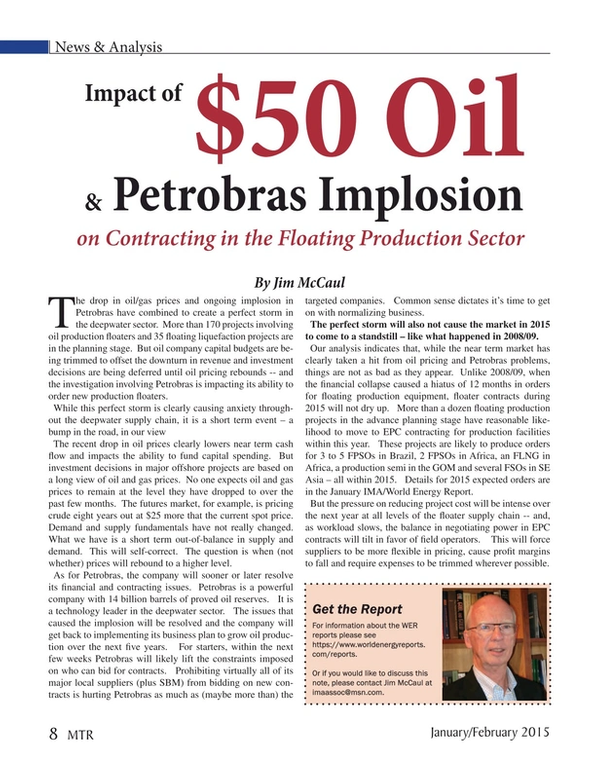
The Deepwater Sector's Perfect Storm
Impact of $50 Oil & Petrobras Implosion on Contracting in the Floating Production Sector
The drop in oil/gas prices and ongoing implosion in Petrobras have combined to create a perfect storm in the deepwater sector. More than 170 projects involving oil production floaters and 35 floating liquefaction projects are in the planning stage. But oil company capital budgets are being trimmed to offset the downturn in revenue and investment decisions are being deferred until oil pricing rebounds -- and the investigation involving Petrobras is impacting its ability to order new production floaters.
While this perfect storm is clearly causing anxiety throughout the deepwater supply chain, it is a short term event – a bump in the road, in our view
The recent drop in oil prices clearly lowers near term cash flow and impacts the ability to fund capital spending. But investment decisions in major offshore projects are based on a long view of oil and gas prices. No one expects oil and gas prices to remain at the level they have dropped to over the past few months. The futures market, for example, is pricing crude eight years out at $25 more that the current spot price. Demand and supply fundamentals have not really changed. What we have is a short term out-of-balance in supply and demand. This will self-correct. The question is when (not whether) prices will rebound to a higher level.
As for Petrobras, the company will sooner or later resolve its financial and contracting issues. Petrobras is a powerful company with 14 billion barrels of proved oil reserves. It is a technology leader in the deepwater sector. The issues that caused the implosion will be resolved and the company will get back to implementing its business plan to grow oil production over the next five years. For starters, within the next few weeks Petrobras will likely lift the constraints imposed on who can bid for contracts. Prohibiting virtually all of its major local suppliers (plus SBM) from bidding on new contracts is hurting Petrobras as much as (maybe more than) the targeted companies. Common sense dictates it’s time to get on with normalizing business.
The perfect storm will also not cause the market in 2015 to come to a standstill – like what happened in 2008/09.
Our analysis indicates that, while the near term market has clearly taken a hit from oil pricing and Petrobras problems, things are not as bad as they appear. Unlike 2008/09, when the financial collapse caused a hiatus of 12 months in orders for floating production equipment, floater contracts during 2015 will not dry up. More than a dozen floating production projects in the advance planning stage have reasonable likelihood to move to EPC contracting for production facilities within this year. These projects are likely to produce orders for 3 to 5 FPSOs in Brazil, 2 FPSOs in Africa, an FLNG in Africa, a production semi in the GOM and several FSOs in SE Asia – all within 2015. Details for 2015 expected orders are in the January IMA/World Energy Report.
But the pressure on reducing project cost will be intense over the next year at all levels of the floater supply chain -- and, as workload slows, the balance in negotiating power in EPC contracts will tilt in favor of field operators. This will force suppliers to be more flexible in pricing, cause profit margins to fall and require expenses to be trimmed wherever possible.
Get the Report
For information about the WER reports please see
https://www.worldenergyreports.com/reports.
Or if you would like to discuss this note, please contact Jim McCaul at [email protected].
Read The Deepwater Sector's Perfect Storm in Pdf, Flash or Html5 edition of January 2015 Marine Technology
Other stories from January 2015 issue
Content
- Underwater Vehicles: Hitchin’ a Ride page: 6
- The Deepwater Sector's Perfect Storm page: 8
- Five Minutes with Tim Taylor, Tiburon Subsea page: 10
- Autonomy Takes Off Underwater page: 14
- DeepOcean Deep Water Operations in Brazil page: 24
- A New Era of Antarctic Exploration: AUVs in Polar Science page: 26
- The Path to the Arctic page: 34
- Experts on Ice page: 42
- Arctic Smarts: Training Innovators and Explorers page: 44
- Deep Thinkers: Advancing Underwater Technology page: 46
- ROV Roundtable: Market Experts Weigh In page: 48
- Modern Tech for a Cold Case page: 54
- Outfitted for Heavy Lifting page: 56
- Michael J. Stewart Retires page: 61


